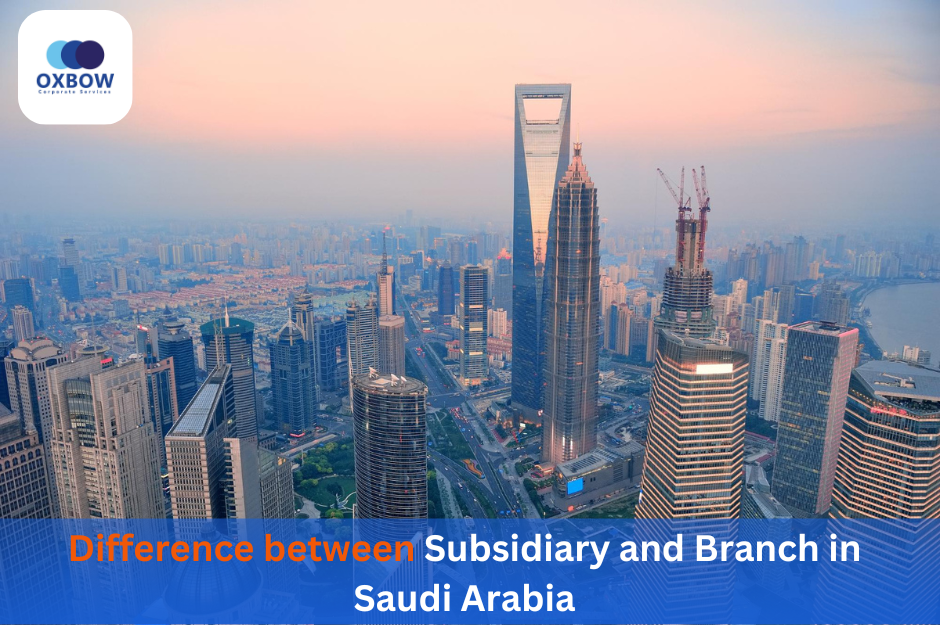Expanding into Saudi Arabia has become a priority for global businesses due to the Kingdom’s rapidly growing economy, Vision 2030 initiatives, and investor-friendly reforms. As one of the largest markets in the Middle East, Saudi Arabia offers foreign companies multiple entry options, primarily through the establishment of subsidiaries or branches. Understanding the difference between establishing a subsidiary and branch in Saudi Arabia is important for companies looking to expand their operations in the region. However, choosing between a subsidiary and branch office in Saudi Arabia can be challenging, as both structures have unique benefits, limitations, and regulatory requirements.
- Understanding Market Entry in Saudi Arabia
- What is a Subsidiary in Saudi Arabia?
- What is a Branch in Saudi Arabia?
- Difference between Subsidiary and Branch in Saudi Arabia
- Setting Up a Subsidiary in Saudi Arabia
- Setting Up a Branch in Saudi Arabia
- Taxation for Subsidiary and Branch in Saudi Arabia
- Employment & Saudization Rules
- Benefits of Opening a Branch Office in Saudi Arabia
- When Should You Choose a Subsidiary?
- When Should You Choose a Branch?
- Key Legal and Regulatory Authorities
- FAQs for Subsidiary and Branch in Saudi Arabia
Understanding Market Entry in Saudi Arabia
Before we compare a subsidiary vs. branch in Saudi Arabia, it is important to understand why companies expand into the Kingdom.
Key Reasons for Expansion:
- Strategic location – Saudi Arabia is the gateway to the GCC and Middle East.
- Large domestic market – Over 36 million people with rising consumer demand.
- Vision 2030 reforms – Diversification from oil, focus on tourism, IT, renewable energy, logistics, and financial services.
- Ease of doing business – Streamlined company formation through the Ministry of Investment (MISA) and Ministry of Commerce.
Foreign companies usually consider subsidiaries or branches as their legal presence, each serving different goals.
What is a Subsidiary in Saudi Arabia?
A subsidiary is an independent legal entity formed in Saudi Arabia but owned fully or partially by a foreign parent company. It usually takes the form of a Limited Liability Company (LLC) or a Joint Stock Company (JSC).
Key Characteristics of a Subsidiary:
- Separate legal identity from the parent company.
- Liability protection – Parent company’s liability is limited to its shareholding.
- Independent management – Can make its own decisions within Saudi law.
- Can engage in wider business activities compared to a branch.
A subsidiary is often the preferred choice for companies looking for long-term growth and local market penetration.
What is a Branch in Saudi Arabia?
A branch in Saudi Arabia is an extension of a foreign parent company, not a separate legal entity. It allows the foreign company to operate directly in the Kingdom under its original corporate structure.
Key Characteristics of a Branch:
- Not a separate legal entity – Legally considered part of the parent company.
- Liability rests with the parent company – Any legal or financial obligation in Saudi Arabia extends to the parent.
- Limited scope of activities – Must align with parent company’s licensed activities.
- Simpler setup compared to a subsidiary – Faster approval process.
Branches are often chosen by companies that want to quickly enter the Saudi market without establishing a fully independent entity.
Difference between Subsidiary and Branch in Saudi Arabia
To clearly understand the difference between subsidiary and branch in Saudi Arabia, let’s break it down across multiple factors.
| Factor | Subsidiary (LLC/JSC) | Branch |
|---|---|---|
| Legal Status | Independent legal entity | Extension of parent company |
| Ownership | Can be 100% foreign-owned (with MISA approval) | Fully owned by foreign parent |
| Liability | Limited to share capital | Unlimited, parent company bears liability |
| Control | Managed locally, independent board | Controlled directly by parent company |
| Business Scope | Can operate in multiple sectors | Restricted to parent’s approved activities |
| Taxation | Corporate tax on profits (20%) | Corporate tax on profits (20%) |
| Zakat | Applies to Saudi shareholders if any | Not applicable as no local ownership |
| Setup Time | 2–3 months (more documents, approvals) | 1–2 months (fewer steps) |
| Capital Requirement | Minimum SAR 500,000–1,000,000 (varies by activity) | Minimum SAR 500,000 |
| Brand Image | Perceived as a local Saudi company | Seen as foreign extension |
| Long-Term Suitability | Best for market expansion and growth | Best for representation or testing market |
Setting Up a Subsidiary in Saudi Arabia
Steps for Subsidiary Formation:
- Obtain MISA investment license.
- Draft Articles of Association.
- Register with the Ministry of Commerce.
- Deposit share capital in a Saudi bank.
- Register with Zakat, Tax, and Customs Authority (ZATCA).
- Obtain municipal and other sector-specific licenses.
- Register with the General Organization for Social Insurance (GOSI) for employees.
Advantages of a Subsidiary:
- Limited liability protection.
- Ability to expand into multiple business sectors.
- Independent management and decision-making.
- Better credibility with Saudi clients, banks, and government authorities.
Disadvantages of a Subsidiary:
- Higher setup cost and longer process.
- Requires minimum capital investment.
- More compliance requirements.
Setting Up a Branch in Saudi Arabia
Steps for Branch Registration:
- Obtain MISA license for branch establishment.
- Submit parent company documents, including board resolution and Articles of Association.
- Register with the Ministry of Commerce.
- Appoint a local manager to represent the branch.
- Register for tax and social insurance if hiring employees.
Advantages of a Branch:
- Faster and simpler registration.
- No need for Saudi shareholder participation.
- Full foreign ownership allowed.
- Easier compliance compared to subsidiaries.
Disadvantages of a Branch:
- Unlimited liability for parent company.
- Restricted business activities.
- Perceived as foreign extension, not a local Saudi entity.
- Less flexibility for long-term market growth.
Taxation for Subsidiary and Branch in Saudi Arabia
Both subsidiaries and branches are subject to taxation under Saudi law.
- Corporate Tax: 20% on net profits for both.
- Withholding Tax: Applicable on payments to foreign parties (5%–20% depending on nature of payment).
- VAT: Standard rate of 15% on taxable goods and services.
- Zakat: Applies to Saudi shareholders of subsidiaries; branches (fully foreign-owned) are exempt.
Employment & Saudization Rules
Both subsidiaries and branches must comply with Saudization (Nitaqat program), which requires companies to hire a certain percentage of Saudi nationals depending on sector and company size.
- Subsidiaries with Saudi ownership may have smoother Saudization compliance.
- Branches, being 100% foreign-owned, may face stricter monitoring.
Benefits of Opening a Branch Office in Saudi Arabia
Expanding into the Middle East has become a strategic priority for global businesses. Among all Gulf Cooperation Council (GCC) nations, Saudi Arabia stands out as the largest economy, with an ambitious reform plan under Vision 2030. The Kingdom is welcoming foreign investors by introducing business-friendly policies and simplifying company setup procedures. One of the most attractive entry routes for international businesses is establishing a branch office in Saudi Arabia.
1. Strategic Location and Market Access
A branch office in Saudi Arabia allows companies to tap into:
- The largest economy in the Arab world – Over USD 1 trillion GDP.
- Population of 36+ million people – A growing consumer base.
- Access to GCC and Middle East markets – Saudi Arabia is a gateway for regional expansion.
By setting up a branch, foreign companies can directly access lucrative opportunities in construction, energy, logistics, healthcare, IT, and retail sectors.
2. 100% Foreign Ownership
One of the biggest advantages of opening a branch in Saudi Arabia is that it can be 100% foreign-owned. Unlike some jurisdictions where local sponsorship is mandatory, a Saudi branch office can operate entirely under foreign ownership with approval from the Ministry of Investment of Saudi Arabia (MISA).
This ensures:
- Full control of operations.
- Retention of profits without local shareholder obligations.
- Simplified decision-making aligned with the parent company.
3. Faster and Simpler Setup Process
Compared to setting up a subsidiary, establishing a branch office in Saudi Arabia is faster and requires fewer formalities.
Why is it simpler?
- No shareholding structure – The parent company owns the branch directly.
- Streamlined registration with MISA and the Ministry of Commerce.
- Lower documentation requirements compared to an LLC or joint-stock company.
On average, a branch office can be operational in 1–2 months, making it ideal for businesses seeking a quick market entry strategy.
4. Lower Capital Requirements
Saudi law requires a minimum capital of SAR 500,000 for a branch office, which is generally lower compared to the capital requirements for subsidiaries (which can range from SAR 500,000 to SAR 1,000,000 or more depending on the sector).
This makes the branch model:
- Cost-effective for startups and SMEs.
- Attractive for large corporations testing new markets before committing higher investments.
5. Full Alignment with Parent Company
A Saudi branch operates as a direct extension of its parent company, ensuring:
- Unified brand identity across international markets.
- Consistent quality and operational standards.
- Direct control of business decisions without independent local boards.
This is particularly beneficial for industries where standardization and brand consistency are important, such as technology, consulting, logistics, and professional services.
6. Wide Range of Permitted Activities
Once licensed, a branch office in Saudi Arabia can engage in most commercial and industrial activities approved for foreign investment. This includes:
- Contracting and construction.
- Engineering consultancy.
- Oil & gas services.
- IT and software solutions.
- Import, export, and trading (with special licenses).
This flexibility allows businesses to operate effectively in Saudi Arabia while remaining tied to their global operations.
7. Profit Repatriation
Foreign investors can freely repatriate profits from their Saudi branch offices after fulfilling tax obligations. This eliminates restrictions on transferring earnings back to the parent company, ensuring financial fluidity and global cash flow management.
8. Tax Advantages
Opening a branch office in Saudi Arabia comes with several tax benefits compared to other GCC jurisdictions.
- Corporate Tax: 20% on net profits.
- No personal income tax on employees.
- Withholding tax exemptions may apply depending on treaties.
- Zakat not applicable to foreign-owned branches (only subsidiaries with Saudi shareholders pay Zakat).
This makes branches a financially efficient structure for international companies.
9. Strong Legal Recognition
Saudi law recognizes foreign branches as fully legitimate business entities. Once licensed, a branch office can:
- Enter into contracts.
- Participate in government tenders.
- Hire staff (local and expatriate).
- Open corporate bank accounts.
This allows branches to operate on equal footing with local businesses.
When Should You Choose a Subsidiary?
A subsidiary in Saudi Arabia is ideal if you:
- Plan long-term operations and market expansion.
- Want liability protection for your parent company.
- Intend to operate in multiple business sectors.
- Aim to build a strong local presence and credibility.
- Seek better opportunities for government contracts and banking.
When Should You Choose a Branch?
A branch in Saudi Arabia is ideal if you:
- Want to test the Saudi market before large investments.
- Need a faster and simpler setup process.
- Plan to engage only in limited activities aligned with the parent company.
- Are willing to bear liability risks at the parent company level.
Key Legal and Regulatory Authorities
To set up a subsidiary or branch in Saudi Arabia, businesses must interact with:
- Ministry of Investment of Saudi Arabia (MISA) – Foreign investment licenses.
- Ministry of Commerce (MOC) – Company registration.
- Zakat, Tax, and Customs Authority (ZATCA) – Tax and Zakat compliance.
- General Organization for Social Insurance (GOSI) – Employee registration.
- Municipal Authorities – Commercial registration and permits.
In Conclusion, the choice between a subsidiary and a branch in Saudi Arabia depends on your business goals, risk appetite, investment horizon, and operational needs.
- A subsidiary offers independence, credibility, and liability protection, making it suitable for companies with long-term growth plans.
- A branch provides a quick, cost-effective entry point, but with unlimited liability and limited business flexibility.
By carefully evaluating the difference between subsidiary and branch in Saudi Arabia, foreign investors can align their business structure with their strategic objectives and ensure compliance with Saudi regulations.
FAQs for Subsidiary and Branch in Saudi Arabia
Can a foreign company fully own a subsidiary or branch in Saudi Arabia?
Yes, with a MISA license, foreign investors can fully own both subsidiaries and branches, subject to activity-specific regulations.
Which is better for long-term business in Saudi Arabia: subsidiary or branch?
A subsidiary is better for long-term business since it offers liability protection, independence, and credibility with clients and government authorities.
Is Zakat applicable to branch offices in Saudi Arabia?
No, Zakat is not applicable since the branch is fully foreign-owned.
Why choose a branch instead of a subsidiary in Saudi Arabia?
Branches are faster to set up, require less capital, and allow companies to test the market before investing heavily in a subsidiary.




